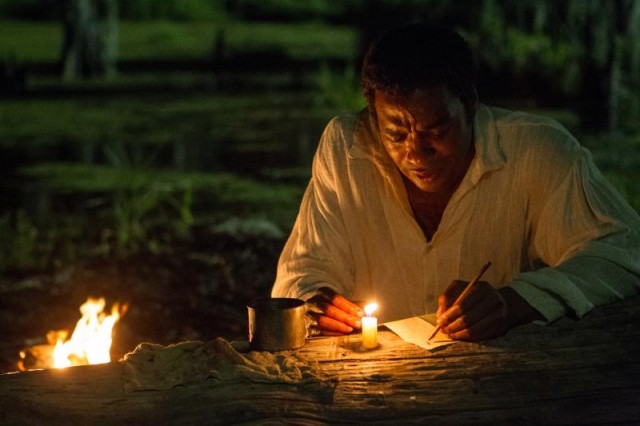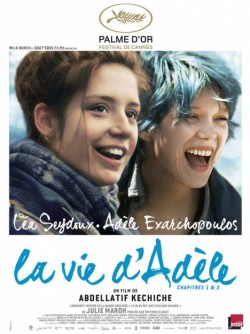Recently, the 2014 (Film Independent) Spirit Awards nominees were announced. As I pored over the list, something dawned upon me – for a change, I have in fact seen plenty of these films well at least more than I could have previously claimed in a given year. A few of the films I have already taken a look at on this blog; see my earlier entries for Short Term 12, Before Midnight, Blue Caprice, Francis Ha, Una Noche and Gideon’s Army.
In addition to these titles, on the list of nominees, I spotted two additional films that have come that are strong contenders this awards season – Twelve Years a Slave and Blue is the Warmest Color. After much much delay, I would like to take this opportunity to let you know what I thought of these films. Again sorry for the procrastination.
———–
12 Years a Slave
I don’t know where to begin with this one. I mean, in spite of the weighty topic – a true, first hand narrative of free man of color kidnapped and held captive in the (I highly recommend reading the book), it is simply a beautiful, cinematic experience. From the cinematography, to the acting and the overall atmosphere created by director Steve McQueen and his cinematographer (Sean Bobbitt), I am almost at a loss for words for how this film moved me.

When I read the announcement about this film being made, I immediately had really high expectations, based largely on the goodwill I had for the filmmaker and his ‘muse’ (Michael Fassbender) from their previous collaborations (Hunger and Shame). After reading the book in the lead up to the release back in October, the one reservation I did have was how they would take this first hand account and translate it into a narrative suited for the silver screen. But why doubt? Screenwriter John Ridley brought the wonderfully eloquent words of Solomon Northup to life.
I briefly mentioned the performances above; now allow me to elaborate and highlight two of the standouts for me. The titular character, as played by the severely underused Chiwetel Ejiofor, really conveys a man who was in a struggle not only for his physical freedom but also his psychological liberation. It is a marvel to see on screen. In the role of Patsy, newcomer Lupita Nyong’o is a revelation. In her portrayal, I feel the echoes of those who preceded us – their enduring unflappable spirit in the face of unimaginable and brutal circumstances.
Ironically, last night I was asked about my favorite film of 2013. Almost without hesitation, I said 12 Years a Slave. I think I am going to hold onto that one.
Blue is the Warmest Color (La Vie d’Adèle – Chapitres 1 & 2 )
 I saw this film as the 51st annual New York Film Festival was drawing to a close. What a singular New York Film Festival 2013 experience to have – a provocative, much talked about Cannes Palm D’Or winner directed by Abdellatif Kechiche (who also offered an assist on the screenplay). Based on a graphic novel by Julie Maroh, Blue chronicles the romantic and sexual coming of age of Adele (Adele Exarchopoulos) and specifically, her relationship with university student Emma (Léa Seydoux).
I saw this film as the 51st annual New York Film Festival was drawing to a close. What a singular New York Film Festival 2013 experience to have – a provocative, much talked about Cannes Palm D’Or winner directed by Abdellatif Kechiche (who also offered an assist on the screenplay). Based on a graphic novel by Julie Maroh, Blue chronicles the romantic and sexual coming of age of Adele (Adele Exarchopoulos) and specifically, her relationship with university student Emma (Léa Seydoux).
I know much has been made about the sexual politics of the movie, but I will leave that for others more qualified to debate the particulars. And for those who choose to see the film, judge for yourself. But for me, I THINK I know where the filmmaker was going with respect to the symmetry of the love scenes and the stage of the relationship between Adele and Emma we were witnessing. That said, some of their earlier scenes felt overlong and a little out of place with the rest of the film’s narrative. And before you ask, no, I am not particularly fazed by expressions of overt sexuality on screen.
In spite of this visceral response, as I ventured out of the screening and into the brisk October night, I made a resolution to myself that in spite of my feelings about this one aspect of the film, I would not let this take away from the overall experience and would therefore try my best to judge the other narrative elements of the film objectively. When I reflected on the film with this in mind, I found that at its heart, the film you are left with is a well photographed, episodic love story, that over the course of its three hour running time (this is not an estimate, it really is three hours) feels rooted in a reality, even if particular acts venture into the realm of the voyeuristic and fantastic.
The Spirit Awards will air March 1st on IFC.
